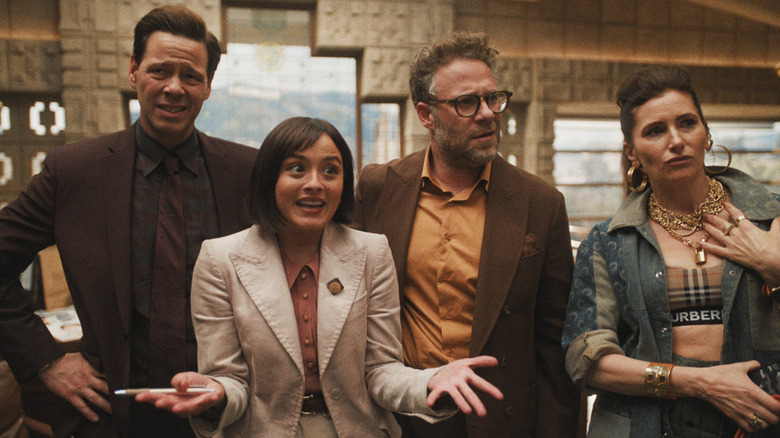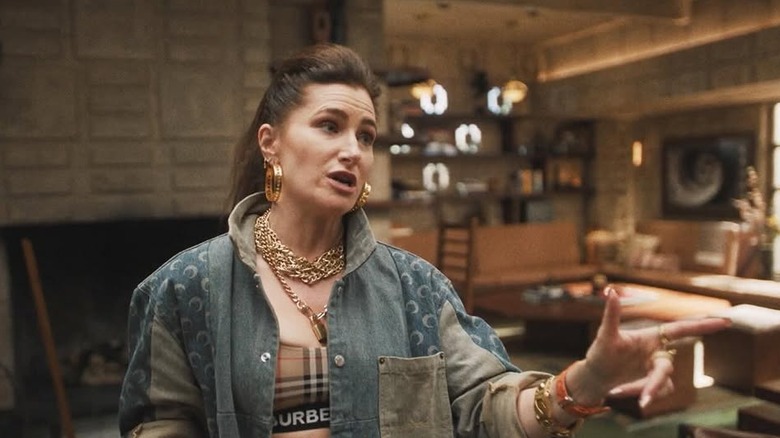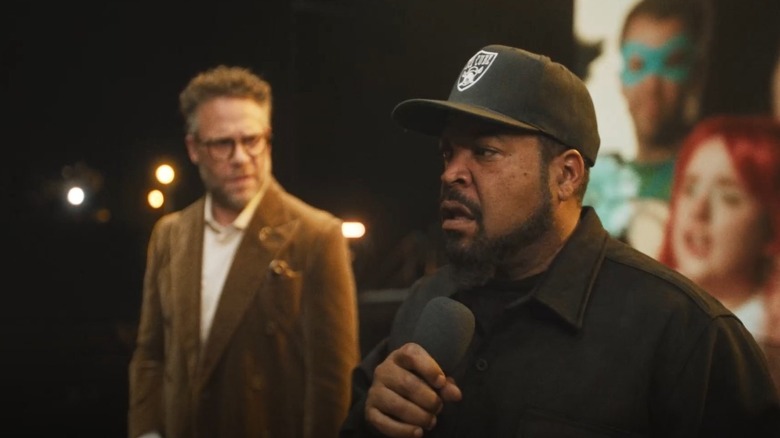The Best New Streaming Comedy Of 2025 Hates AI As Much As You Do
This article contains spoilers for "The Studio" episode 7, "Casting."
I try to avoid hyperbolic hot takes, but the more time goes on, the more I'm starting to think that Seth Rogen truly is one of the most brilliant comedians to ever do it. He broke into the mainstream in the 2000s thanks to projects like "Superbad" and "Knocked Up" (both films I adore, for the record), but as the "Freaks and Geeks" alum has grown, his comedy has evolved to an incomparable level. He currently executive produces and stars on Francesca Delbanco & Nicholas Stoller's Apple TV+ series "Platonic," which very well might be the smartest show about disaster millennials failing to accept the realities of their societal roles as adults. But his true masterpiece is the cringe-comedy Hollywood satire "The Studio" (also on Apple TV+), co-created with frequent collaborator Evan Goldberg along with Alex Gregory, Peter Huyck, and Frida Perez.
We at /Film have been loving "The Studio," especially how the show utilizes beloved Hollywood figures, like asking Martin Scorsese to pitch an idea for "The Kool-Aid Movie" and letting perennial nice guy Ron Howard absolutely lose it on Rogen's studio executive character Matt Remick, to the point of cursing him out and throwing his trademark hat with so much force it knocks Rogen through a glass table. Each episode tackles a part of the movie-making process, but rather than completely biting the hand that feeds, it balances its workplace comedy insider knowledge with Remick's desperation as a legitimate cinephile to make the best movies possible in a system rigged against itself.
It's also a show that hammers home the importance of having human beings with varying perspectives involved in the creative process. No algorithm in the world can ever replace the ingenuity that comes from being a person with thoughts, feelings, hopes, dreams, and experiences that shape our perspectives. Which is why season 1 episode 7, "Casting," is the best episode yet of 2025's best new streaming comedy.
The Studio skewers white fragility and out-of-touch executives
In the world of "The Studio," pre-production on "The Kool-Aid Movie" is well underway. Nicholas Stoller has signed on to direct, two young writers have crafted a script the studio loves, and they've got Ice Cube signed on to voice the Kool-Aid Man. Remick and his colleagues, executive Sal Saperstein (a career-best Ike Barinholtz) and marketing head Maya Mason (a genius Kathryn Hahn), stand in front of their casting board and panic ... does it appear racist for The Kool-Aid Man to be voiced by a Black actor? The rest of the episode is an exercise in skewering white fragility as they desperately try to find a casting combination that is as progressive and diverse as possible without seeming as if they're leaning into racist tropes that will get them lit up on social media. They don't actually care about not being racist, they just don't want to look racist.
They consider recasting the entire Kool-Aid CGI family with Black actors to make sure they're not disrespecting Black women if the Kool-Aid Man's wife isn't Black, and then panic because it means all the Black actors will be CGI. They awkwardly ask Maya's Black team member Tyler (Dewayne Perkins) for advice, and Lil Rel Howery and Ziwe are brought in to consult. It's debated whether or not they can make the white characters lesbians to "offset" their whiteness and give them an adopted Asian child to add more diversity, but they eventually decide the best course of action is to "Black Panther" it and have the entire cast be Black. Another great bit of satire is that they decide the human couple should be played by Don Cheadle and Keke Palmer, which would give them a nearly 30-year age gap as a couple, and this never crosses anyone's mind as a concern. Genius.
But their excitement is cut short when the writers decide that if the cast is all Black, they shouldn't be writing the script as they're not Black, and they leave the project. Remick even points out, "In an attempt to not be racist, you're limiting the amount of Black people you can write for." This is at the center of how so many white executives actually think, and why it's so hard for marginalized people to get their stories greenlit. Stoller agrees to rewrite it himself, but notes that to save some time and money on the film's budget to do it ... he's going to use the assistance of AI animation to get it done. This is where the show's satire evolves from good to great.
Ice Cube's thoughts on AI are all of us
Remick eventually straight up asks Ice Cube if it's racist for him to voice The Kool-Aid Man, and he rightfully puts Matt in his place. They're going to go to a Comic-Con a few days later to announce his casting, and everyone at Continental Studios feels like they've avoided a massive PR disaster. But in focusing so much on whether or not they will be perceived as racist, they've completely neglected the actual problem with "The Kool-Aid Movie," and the attendees at their Comic-Con panel gladly hand them their ass about it.
During the Q&A, an angry artist asks if the rumors are true and they're going to be using AI animation, which takes away jobs from artists and completely devalues the craft. Ice Cube starts a "F— AI!" chant before leaving Remick alone on a stage to be booed into oblivion. Sal and Maya watch Matt get booed from the wings and are completely unmoved, indicating that while accusations of racism terrify them, critiques of AI seem "fine." I immediately thought about the studio heads who greenlit openly racist films like "Soul Man" and wondered if they thought people having an issue with the blackface was "fine" then, too.
Every time some creatively bankrupt chode posts waxy gifs of "I asked the BleepBlorpSlop Machine to show me 'Pulp Fiction' if it were made by Wes Anderson" and the results goes viral, it seems like studio execs are only seeing "Wow, this video got a million comments." They completely neglect to take it just one click further to see that 900,000 of those comments are people talking about how morally reprehensible the work is, because the 100,000 they can see are paid-for-Bluecheck sycophants that have been prioritized by the algorithm.
In less than two minutes, "The Studio" was able to dissect the rampant behavior of white people fixating on public perception rather than actually improving their understanding of race and point out how deluded studio executives are about the serious threat of AI. Independent journalist Kat Tenbarge of Spitfire News recently put out a fantastic piece about how the push to normalize AI is nothing more than the second-coming of the "pivot to video" trend that decimated the journalism and media publishing industry. Those in positions of power are too afraid of potentially being wrong later down the line concerning AI to see how wrong they are right this second.
Ice Cube is right. "F— AI."


